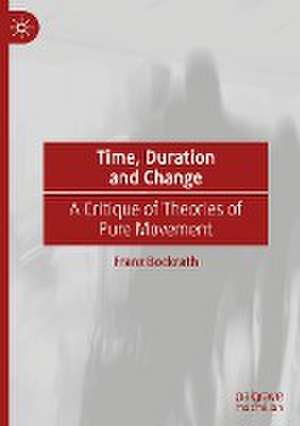Time, Duration and Change: A Critique of Theories of Pure Movement
Autor Franz Bockrathen Limba Engleză Hardback – 23 noi 2023
Preț: 732.70 lei
Preț vechi: 893.54 lei
-18% Nou
Puncte Express: 1099
Preț estimativ în valută:
140.24€ • 145.85$ • 117.52£
140.24€ • 145.85$ • 117.52£
Carte tipărită la comandă
Livrare economică 13-27 martie
Preluare comenzi: 021 569.72.76
Specificații
ISBN-13: 9783031405891
ISBN-10: 3031405897
Ilustrații: XVII, 347 p.
Dimensiuni: 148 x 210 mm
Greutate: 0.59 kg
Ediția:1st ed. 2023
Editura: Springer Nature Switzerland
Colecția Palgrave Macmillan
Locul publicării:Cham, Switzerland
ISBN-10: 3031405897
Ilustrații: XVII, 347 p.
Dimensiuni: 148 x 210 mm
Greutate: 0.59 kg
Ediția:1st ed. 2023
Editura: Springer Nature Switzerland
Colecția Palgrave Macmillan
Locul publicării:Cham, Switzerland
Cuprins
1. Introduction.- Part I. Motion as a Problem of ‘Pure Thought’ and ‘Pure Perception’.- 2. The Immobility of Being (Zeno).- 3. Being of Motion (Bergson).- Part II. Motion as A Phenomenon of Transition.- 4. Motion as Phenomenal Contradiction (Hegel).- 5. Motion as A Process of Symbolic Formation (Cassirer).- 6. Motion as Logic of Practice (Bourdieu).
Notă biografică
Franz Bockrath is a member of the faculty of human sciences at the Technical University Darmstadt (DE). He studied philosophy, political science and sports science and worked at several universities. In 2004 he became professor in Darmstadt. His main research fields are cultural philosophy, social philosophy, and philosophy of the body.
Textul de pe ultima copertă
This book studies various perspectives in the history of European philosophy on the relationship between time and movement. Ever since the pre-Socratic thinker Zeno of Elea linked time and space to understand bodily movement, his so-called paradoxes of motion have remained unsolved. One of his most important critics, the French philosopher Henri Bergson, criticized the usual connection between time and space and established a new way of understanding time as duration (durée). Whereas Zeno presented an objectivist understanding of time, Bergson emphasized its subjectivist meaning. Both contradictory positions seem incompatible, referring to pure intellect (Zeno) on the one hand or pure sensation (Bergson) on the other. Looking at Hegel's Phenomenology, this book shows that the outer and inner consciousness of time became crucial to his principle of movement and change. In his view, time is an integral part of dialectical processes that are historically substantiated. Hegel sought to subordinate pure concepts and ideas so that they would become indispensable moments of the self knowing spirit. Cassirer appreciated the idealism of coming into being but rejected Hegel's concept of the absolute. Instead, he established his philosophy of symbolic forms, in which the development of different perceptions and conceptions of time - from situational affective experience to the mathematical system of relations - determines the direction of the symbolic formation process. In the end, the sensitive concept of time is replaced by the relational concept of natural numbers, in which all here-and-now experiences are embedded. Finally, Bourdieu attempts to reintegrate symbolic forms into social processes. The book reflects on the concepts mentioned here by discussing their pros and cons in order to shed more light on the relationship between time and movement in European thought.
Franz Bockrath is a member of the faculty of human sciences at the Technical University Darmstadt (DE). He studied philosophy, political science and sports science and worked at several universities. In 2004 he became professor in Darmstadt. His main research fields are cultural philosophy, social philosophy, and philosophy of the body.
Franz Bockrath is a member of the faculty of human sciences at the Technical University Darmstadt (DE). He studied philosophy, political science and sports science and worked at several universities. In 2004 he became professor in Darmstadt. His main research fields are cultural philosophy, social philosophy, and philosophy of the body.
Caracteristici
Brings Zeno of Elea in conversation with Hegel, Cassier, Bergson, and Bourdieu Considers and evaluates various philosophical perspectives on the relation between time and movement Studies time from the perspective of phenomenology, symbolic construction, and social construction,
